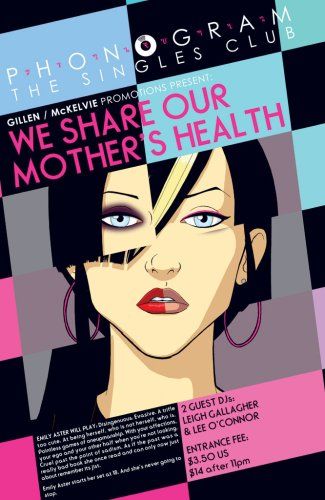The second series of "Phonogram" has already delivered two near-perfect single-issue stories. The emotional highs and lows of the opening issues would seem impossible to top for the rest of the series, so it's perhaps wise for the title to change tack a little, and go for something a bit more like the "Phonogram" we originally knew and loved, with an issue focusing on Emily Aster, also featuring a fair amount of "Rue Britannia" protagonist, David Kohl.
True to "Phonogram" form -- and I'll keep saying it until everyone agrees -- it's not a story that requires you to get the musical references to work. The high concept of the story should be familiar to anyone who's ever struggled with their identity. At some point, we've all felt the sting of regret and contempt that represents the gap between who we were, who we are, and who we want to be. True, in this case it's an identity struggle framed in terms of songs, music and the culture that surrounds the same, but the context gives you enough detail to keep the story universal.
Woven around the high concept, we see more of the story intersections that glue this series together, and more of Gillen's fantastically sharp dialogue as Aster and DJ Seth Bingo go head to head in trying to out-bitch one another. As ever, though, it's McKelvie's artwork that helps elevate the issue to the next level of technical greatness. It's little wonder he's credited with providing "music" rather than "artwork", as his fluid panels and gift for portraying a wide range of emotions breathes life and rhythm into Gillen's brilliantly calculated script. Along with colorist Matt Wilson, McKelvie captures a visual atmosphere that practically pulls you into every panel.
The b-sides for this issue are a fantastic supplement to the "a-side", as Kid With Knife retells the story of "Rue Britannia," rendered as a hilarious pastiche by Leigh Gallagher, and featuring Gillen's most self-effacing moments yet, alongside yet another two-page outing for Indie Dave with art by Lee O'Connor. Once again, "Phonogram" delivers a truly stunning single issue package that makes the most convincing case yet for the continued existence of the "floppy" format. If only every comic had as much work put into it as "Phonogram."

